#not really a rare pare considering so many people ship it but I could think of anything else
Explore tagged Tumblr posts
Text

Cringetober Day 9: Rarepair
Fiddleford has no strength and Stanley is all bronze
#not really a rare pare considering so many people ship it but I could think of anything else#fiddleford my beloved#I adore gravity falls but don’t expect a lot of fanart of it really in the future#cringetober#gravity falls#fiddleford mcgucket#fiddleford#fiddleford gravity falls#stanley pines#grunkle stan#gravity falls stanley#fiddlestan#fiddstan
2K notes
·
View notes
Text
The Land That Our Grandchildren Knew (B!Reader x Brian May)
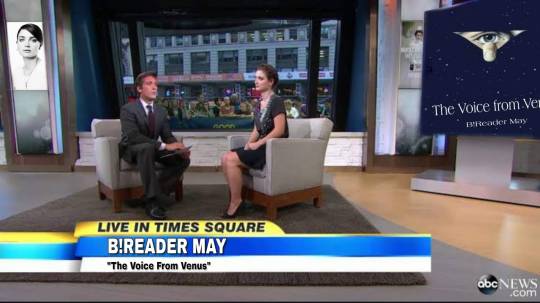
THIS WORK IS PART OF THE ORIGINAL TIMELINE
Requested: NO
Type: SFW, FLUFF ?, ANGST.
Summary: A little glance at life back to normal after Brian and B!Reader get over the cheating scandal.
Warnings: None.
A/N: So this came out of nowhere in my mind. I have struggled with being creative for a while and I just do not know why(?) but here we are! I hope someone out there enjoys reading this one.
*For anyone who does not remember (lol it has been a while): B!Reader (often B!R) is "Brian!Reader", and R!Reader (or R!R) is "Roger!Reader".
“The one thing he did not know was how much I loved him. In a previous life, in a time when things were so much more complicated. When war was splitting us apart and leaving us breathless. Motionless in a world of aggressive turmoil. There was little we could do when everything was amiss. All around us things were blowing up, giving in upon themselves the buildings fell, and the cities died along with their lights and spectacles.
“The love I grew and nurtured for him was the last reminding power of the old Earth, scattered through the cosmos like dust as I searched for him in a ridiculous journey. I did not meet a king in a tiny planet, and I never saw a rose grow on the dry lands of the foreign space countries. We had each other but time made it so that I was here today while he was here yesterday. Today was never ours, today was a promise we believed and ate up and followed with blind eyes until the moment when the sound of truth, deafening and cruel, locked us out of each other’s life. And still, forever, my love for him is true and enduring. Out there, I know he will feel my presence in the air, see me in the clouds, savour me in the smell of rain and grass. He will miss me when the night is cold, and the sound of wind reminds him of my voice��� Yes, he will be empty when he hears the silence, the way I will always feel too when I look back at Earth and regret every second spent away from the one who called me Venus.”
The crowd claps and smiles and I see the people in the front look at the books in their hands with expressions of confusion and deep thought. A good reason to write something is to make people wonder, so for B!Reader this one was a success. She had taken so long to finish the manuscript, not that she was being lazy; with the scandal of Brian cheating and the twins taking sides, it was hard to focus on this. This book was not what she intended on writing when she began doing research for it. It started with the Irish War of Independence, she went around Britain meeting historians with much better understanding and knowledge on the topic. It soon turned upside down when the news appeared on every single form of media… Brian’s stunt. She would call it what it was now; he had cheated.
It was hard to get over it. B!Reader took time off with her mother in Scotland, she had taken the kids with her, much to Brian’s displeasure, but he was in no position to complain. When she came back home, she was still defeated by the details. Brian’s lame explanation sounded more like an excuse but even she had to admit that her husband did not have the best track record when it came to women. She was probably the one he had been the most loyal to at that point – even when he had cheated on her once.
So, she tried. They sought professional help. A therapist. First couple’s therapy, and then one-on-one sessions alone. She hated every second of it, which could not have been fun to hear for their therapist. Nothing seemed to be helping, in fact B!Reader talked to a lawyer in secret… but her career was also on the line at that point, and she was desperate for ideas, desperate to reconnect with the only man she ever truly and completely loved. Her manager had the idea, “read some of Brian’s stuff, maybe ask him about his PhD work, maybe he will inspire you and if he doesn’t at least you will have spoken to each other… it’s worth a try”. And so B!R did that, although not in the way her manager had meant. She was stirring her on the direction of reading some of his lyrics not his space dust thesis… Nevertheless, the story began there.
B!R could not understand much, and she wound up spending a lot of time talking about physics and space with her husband. Brian was a patient teacher, she already knew that, but it was now being confirmed to her. He was also happy to be able to go on and on for hours, the topics where his cup of tea, and they had numerous cups of tea too while B!R took notes and began toying with a historical fantasy mix for her next book.
Today she was reading from her favourite chapter in the book. It had been a massive hit; one she could not quite understand. If she was being honest, the book was more like therapy for her than her actual therapy sessions had been. She cried while writing it and poured a lot of emotion into it, which she rarely did. Her writing had always been more …impersonal, presented almost as a sort of biography of fictional characters rather than real moving parts of the imaginary world they were living in.
She had never written such an odd story before, with time skips and a weird space journey concepts implanted in the middle of 1920 Ireland.
“You did great, mum.” A proud Fred wrapped his arm around her middle.
Even though the teen boy was still that, a teenager, he managed to already stand a couple centimetres taller than his own mother.
“Thank you love, did you get anything of that?” She wondered, wrapping her arm around him in the familiar way a mother does.
Arm around his shoulder, soft play of the tender fingers on the dark curls on the back of the head of her “little boy”.
“Nothing at all,” he smiled and shrugged, honesty dripping in shameless glee from his tone. “But that’s the cool part, I don’t think anyone gets it.” The younger of the twins looked at his mother up and down in her bright blue dress. “Except Dad. Was that the point?”
B!Reader looked at her son and inhaled a deep long breath, which she held for a moment. Her brows furrowed and her mouth moved like that of a fish.
“Maybe.” She conceded.
“Hey mum, would you sign my book?” Harry interrupted, bringing along Jazz and a peculiarly uninterested Max.
Harry gave his mother a wide smile and put a copy of her own book in her hands.
“For Harry, please.”
“Dork,” Max rolled his eyes.
He was the only one to admit he had not finished the book yet the previous weekend when Fred mentioned his mother was doing a reading at a local bookstore while they sat by the Taylor’s pool. And he rushed to get through it. Max was not dumb, and he managed to grasp some of the concepts in the complicated plot, although he did not let on to any of his friends.
“Loved the wormhole bits Mrs May.” Max said once Harry had his signed copy reading for Harry with Love. “That dark hole and the speed of dark and light near the end were mind-blowing. I never thought of you as a fantasy writer!”
B!Reader nodded and blushed at the compliments. Max was a lot like Roger in that he did know how to make a girl blush with what appeared to be little effort.
“I am glad you liked it,” she said, a trace of pride in her voice.
“I really wish Darragh and Conor had ended up together,” Jazz voiced from around Harry’s tall lean and awkward teen figure. “They were obviously meant for each other.”
Fred had been in tears when he read the ending of the book. Of course, he would have hoped for his mother’s first queer paring to end together but what that did was echoing life.
“You have to be the eighth person who’s said that to me today.”
R!Reader, Roger and Brian were in a conversation of their own next to the long table B!Reader was about to sit before to meet some fans and sign as many copies of her book as time allowed.
She eyed the silver hair on her husband’s hair, she had been discreet when describing Darragh in her book. A tall, talented, middle-aged, idealist Irish man. A man born in a difficult time. A man who fell in love by mistake, with Conor. A young man described often as immature, who enjoyed a quiet life on board of a spaceship when he got caught up in a black hole and wound up going back hundreds of years and miles into the past. Conor had almost been killed in his attempts of helping his beloved Darragh in fighting what he considered to be hiswar. The battles gave their relationship meaning, although it was never spoken about between them. The adoration was always palpable and present to the last page. Down to the moment when Conor acknowledges that his lover cannot come with him once he finds the way back into his ship, and then it turns into a matter of will. Darragh is revealed to have a similar story, only that… he was left stranded in 1905 with no way back to his ship. “The voice of Venus” was really a metaphor for B!Reader. A complicated one, as her feelings were when she had to love the man who broke her heart. She felt lost the way Conor felt, but she could tell Brian had been lost for a while before the entire ordeal – defeated in the same manner as Darragh. And it was fitting, he was older, he was educated. He should have known better than to play in the physics lab with those dangerous materials. Brian should have known better than to play with that old woman. Conor could have turned his back on Darragh, he knew he was of no help now that he was so invested in the past – now their present. He knew Darragh and himself would never be able to be together if he stayed and they would most likely get killed if they marched on. So B!Reader made them split. She was about to leave Brian when she started writing her book, so it made sense. And when she realised, she did not want to end her marriage, she still wrote it that way because this was the ending she had seen coming for herself before – one she fortunately managed to evade, which still was the ending for many couples.
B!Reader watched the teens as they began discussing the book, Max and Jazz were defending the plot, Fred joined in and the three of them seemed to be getting passionate about proving Harry wrong. The eldest of the group was stubborn about his stance on Conor being right to leave Darragh.
His mother could not help but remember that same stubbornness from the first few weeks after the story broke. Harry had been the one to take it the hardest. When they packed for Scotland, she had to stop him from shattering his project guitar, the yellow guitar he and Brian had been working on for a while. “I don’t want it! I do not want anything from him! He is a liar!” He had yelled, with the side of his face still reddened from a slap he received from Brian. She still could not believe she managed to stay impartial at that moment after the mess that had happened in the kitchen when Harry insulted his father – earning a slap from him.
“It’s alright,” B!Reader placed her arm around the twins’ shoulders. “Conor had to go back anyway. He had a family in the spaceship.”
“What?” Jazz was the first one to open her mouth.
With a laugh, the young writer looked at the confused faces around her. “He could never stay…” She shrugged.
Harry’s expression flashed with a difficult emotion, which both Jazz and his mother noticed.
The short girl flipped her long blonde hair and checked the time on her phone, “no wonder I’m hungry! Who’s coming?” Her blue eyes searched around in an almost innocent manner.
“You got to be joking, we JUST ate.”
Max stepped back from his sister and Fred followed, “sorry, I told dad I’d get lunch with him.”
Blue eyes flipped onto Harry’s figure. B!Reader gave him a squeeze and let go, the sigh he let out being enough of an answer for Jazz to show a large smile, reaching out to grab his hand and pull her to her side. It almost seemed a pass of the baton.
The boy walked taller than Jazz and still, it looked like he was the smaller child. She was sure they had been doing a good job as parents, although that slipdid a number on Harry. The curly haired boy pulled the glass door open and let Jazz go first, only to have her childishly cling on to his arm once they were outside, a smile breaking his serious expression when his young friend told him something – they were too far for B!Reader to make out what Jazz said.
“Where are those two going?” Brian walked up to her.
He had a cardboard cup of coffee in his hand, which he offered to her. With a mumble she took it and had a testing sip – it was too bitter, but it would do. “Nando’s. Probably.” She gave her husband a soft smile.
Brian nodded in silence, a reflective look on his face.
“He needs some time, Bri.” She guessed what he was thinking about.
“It’s been a year,” he said with caution.
“He is getting over it, love.” She took a step closer to Brian and whispered, “he’s picked up the guitar again.” They shared a look before someone called for B!Reader and she left her husband with a peck on the cheek.
#original timeline#about the original timeline#b!reader x brian may#b!reader#brian may#present day!brian may
21 notes
·
View notes
Text
How To Publish Well (What These Tags & Warnings Even Mean)
In order to publish to Archive of Our Own (AO3), you must fill out several data fields for each piece of fan fiction. Beyond improving your fic’s searchability, these data points are important for a more crucial reason - your readers’ safety.
Too Long; Didn’t Read (TLDR):
TAG WITH THE READER IN MIND: Try to get outside your head as the writer and put the readers’ potential triggers, preferences, and experience first. Take the time to learn the details below. Once you know them, it’s hard to forget.
USE A CLEAR WARNING: Think twice before keeping the default “Creator Chose Not To Use Archive Warnings.” If your story has no graphic violence, major death, rape/non-con, or underage sexual activity, go with “No Archive Warnings Apply.”
BREVITY IS THE SOUL OF WIT: Keep your summaries & tags brief to be easily digestible to the reader.
Category
This designates the romantic relationships present. Most fanfic involves romance, so for the few who don’t, your ‘category’ is “Gen/General” - For all others, read on:
F/F & F/M & M/M - Female/Female, Female/Male, and/or Male/Male romantic relationship, respectively.
Multi - More than one kind of romantic relationship, or a relationship with multiple partners.
Other - Romantic relationships that do not fall in the above. This is RARE. Do not tag family relationships with this. You will confuse/alarm your readers.
Gen/General: Either no romantic or sexual relationships or relationships are not the main focus of the work.
Relationships
Very simply, a: / (slash) indicates a ROMANTIC relationship - Jill/Joan are getting sexy & (ampersand) indicates a PLATONIC relationship (friend/family) Jill & Joan are best buds
Note: I beg of you (as a lover of side character ships) to only list those relationships that are SIGNIFICANT to the story. If two people are together or friends but their relationship has no change or spotlight in the fic, please do NOT include their relationship tag. Your story will populate when people search for that couple and irritate readers (such as myself) who find the coupling has no significant ‘story’ to tell. Readers are also learning to use a new “otp= true” search functionality which may limit your reach. If people are looking for just a story about H+P but you include 3 other relationships, you wouldn’t show up in that search.
Characters:
Self-explanatory. List all the characters in the story that are important enough to name (more than a brief flash of them in the background).
Warning:
No Archive Warnings Apply - Reader doesn’t need any warnings as there is NO graphic violence, major character death, rape/non-con, or underage sexual activity.
Choose Not To Use Archive Warnings - One of the warnings below apply, but you don’t want to tell the reader.
Note: This the DEFAULT. Please consider other options, as this is very vague and many readers, like myself, avoid fics with this tag because it sounds like it's saying “The writer should warn you about something awful but is choosing not to.”
Graphic Depictions Of Violence - Gory, graphic, explicitly described violence.
Major Character Death - A central character to your story dies.
Rape/Non-Con - Non-consensual interactions, often sexual, are present in your story.
Underage - Characters under age 18 engage in sexual activity (doesn’t include kissing or vague references).
Rating:
Not Rated - Default. This is treated the same as mature/explicit re: warnings since the site cannot detect what content is in your work. Please avoid this and be clear!
General - Suitable for all ages that can read. Should have no disturbing content.
Teen And Up - Appropriate for ages 13 and up. Can have romance but not explicit whatsoever
Mature - 18+ Adult themes present (sex, violence, etc), but not overly graphic or taking up a large portion of the story. Like a rated R movie.
Explicit - 18+ The story revolves around adult themes (erotica-level sex, very graphic violence and/or disturbing imagery).
Additional Tags
This is where it gets interesting. Ideally, tags are simple ways to inform the reader about the content. However, the way you use tags can either be super helpful to your reader, kinda funny, or come across as annoying (even callous/harmful). My suggestions:
KISS - Keep it Simple, Stupid. Stick to the tags that truly represent the fic. Help readers search and find it based on the content. Don’t go overboard.
Look over the most popular tags and pick a handful that fit. Ask your beta reader or other writers for ideas on good tags to use! As of May 2020, these were the most frequently used tags in the Lore Olympus fandom: Fluff, Romance, Smut, Oral Sex, Angst, Implied/Referenced Rape/Non-con, Fluff and Smut, Fluff and Angst, Not Beta Read, Shameless Smut
If you have to make a joke with a tag, please limit to a couple. Many people make their tags humorous, though hearing from backend (unpaid) AO3 staff, this becomes a hassle for them to clean up down the road. If you do make humorous tags, please be mindful and perhaps pare down their use.
Why is tagging/warning/rating important?
The better you tag/code your fiction, the better AO3 as a search engine operates. See “How to Search AO3.”
More importantly, your fiction affects your reader. We hope positively, but some content can be triggering or harmful. The beautiful thing about AO3 is its rating, warning, and tagging system, but it’s only good if the writers utilize it.
Many readers will seek out your fics based on how well you categorize. Perhaps they are seeking out a long-form angst with a Mature/Explicit rating.
Other readers will avoid your fics for the same reason (to protect themselves). Perhaps they explicitly avoid angst, sexual content, abuse and violence (to not trigger their own trauma).
Treat your readers kindly. Be transparent about your work (don’t try to trick people to read by avoiding tags/warnings). Warnings and tags should not be seen as “spoilers” but rather a necessary precaution to keep the reader informed and safe.
Part of a Series or Chapters?
Deciding whether you want your multi-part fan fiction to be one “work” with multiple chapters or separate pieces that are part of a “series” is a tough one. This is just a suggestion and not always the case:
One fic with multiple chapters - There is one main story. The first chapter and last chapter form a cohesive journey, and each piece cannot really be read (enjoyably) alone.
A series with multiple parts - The reader could read one part and be satisfied. They could even jump into part 2, 5, or 12 and read it without much context and find the story enjoyable and with its own individual, unique arc.
Summary
Give the reader a sense for the story in 2-4 sentences (think of it like an ad copy tweet for your favorite book).
Maybe include a short quote to entice or give a sense for your voice. Short being the operative word.
Avoid self-indulgent apologies or overly personal context. Chapter Notes (which you can place either before or after a chapter) are designed more for these personal messages, such as if you’re nervous because it’s your first fic or what it was that inspired you or saying thanks to a friend/beta reader.
There is more to AO3, such as co-authors, challenges, collections, etc. But that’s enough for now :)
Sources: This excellent Tumblr post, AO3’s lengthy FAQ section, and personal trial and error as both a reader and writer.
5 notes
·
View notes
Text
Three 1970s Horrors Worth Watching (that are not part of this film series)
The Horror by the Decade series started innocuously enough, with someone requesting some recent film recommendations. That got me to thinking about trends, and recommendations from previous decades, and how many movies that were true classics I was familiar with but had never seen, and thus the idea “hey, let’s watch movies from every decade!” came into being.
But obviously you can’t watch every horror movie from every year, so there had to be a selection process in place. Here’s roughly how I’ve been choosing movies:
Search Google for “horror movies {year}” for each year of the decade
Research them a bit and pick out everything that is familiar, historically significant, or seems especially interesting, and put them on a list
Pare the list down to 1-2 of the most interesting titles per year
Look for themes and pair movies up according to theme (since we watch two movies a week)
In order to save time, any movie that both I and @comicreliefmorlock have seen recently/a lot gets knocked off the list. In the 1970s, that means removing three extremely good, extremely important movies, so I wanted to talk about them a bit here.
Follow below the cut for thoughts on Jaws, The Exorcist, and Alien
youtube
Jaws, made in 1975 by Steven Spielberg, is based on a novel of the same name written by Peter Benchley. Richard Dreyfuss and Roy Scheider team up to kill an unusually large and aggressive great white shark that is terrorizing the beach in a quiet New England town.
Fun fact: Until Star Wars was released two years later, Jaws was the highest-grossing movie of all time! This is probably due in part to how much money Universal decided to sink into its distribution and marketing, but the film’s quality has to play a big part too. It really is a magnificent movie and is probably a big part of why people are still scared of sharks.
Some things that are notable about Jaws:
It has one of the most iconic and effective film scores in cinema. Everyone knows the Jaws theme, and it’s been used to basically mean “impending danger!” in a jokey way for...I mean, at least 30 years, because I know that was a meme when I was a kid. I imagine it has been since 1975. That’s just a really impressive feat, and John Williams (yes, the Star Wars guy) deserves acclaim for it.
Music aside, Jaws is an excellent study in suspense and restraint. Technological limitations meant they couldn’t show the shark as much as they’d wanted, so scenes had to be filmed suggestively to ramp up the tension. (You do still get to see a lot of wonderful big scary shark, though, and honestly the effects still hold up pretty well to this day)
The performances are really good, too. The leads have a great chemistry and play off of each other really well. The script was a joint effort, getting passes from several people (including the book’s author), but a comedian Carl Gottlieb got a pass at it, and that humor really helps to elevate the film.
The most powerful thing about Jaws, though, is that it taps into a mythic seed that renders it utterly timeless. There is an echo of Moby Dick in Quint’s character and motives, with a similarly tragic arc. But it draws on something older and deeper, too. The premise of “man-eating wild animal terrorizes a community, a bounty is put on its head, only a hero can kill it” has been a staple of mythology for thousands of years.
Man-eaters are real, and they become the stuff of legend -- dating at least as far back to the monstrous Nemean Lion that could be slain only by Heracles. Historically, there are accounts of man-eating wolves, lions, tigers, etc. terrorizing locals, sometimes inspiring local werewolf legends - you can read about just a few of them here: https://listverse.com/2010/10/16/top-10-worst-man-eaters-in-history/
I think I watched Jaws for the first time when I was 8 (I saw all the sequels too, there was a cable marathon) and I was utterly captivated. I feel pretty confident if I showed it to an 8-year-old today, they would be too. It’s just that kind of movie.
youtube
The Exorcist, released in 1973 and directed by William Friedkin, was based on a novel by William Peter Blatty, who also wrote the screenplay.
The story is about a 12-year-old girl, Regan, who begins acting strangely after playing with a ouija board. Once medical causes are ruled out, her mother turns to two priests for assistance; they come to perform the exorcism and have a harder time than expected with casting out the demon, to say the least.
The film is still considered one of the most frightening horror movies of all time by some, and at the time of its release it was a sensation. Movie-goers were said to have all sorts of reactions, from fainting and vomiting to having miscarriages and heart attacks. Contemporary psychologists even wrote about “cinematic neurosis” in people who had watched the film: https://www.ncbi.nlm.nih.gov/pubmed/1151359
The story crossed a lot of boundaries (even for the 1970s) and you have to bear in mind that this was a major cinematic release, not a grindhouse exploitation film. Most film-goers in 1973 were absolutely not prepared to see an innocent child spouting off vulgarity, urinating on the floor, and masturbating with a crucifix. And some of the practical effects, like the famous head-twisting scene, are still really creepy.
This is one of those movies that’s hard to watch with fresh eyes because it was so influential on all of cinema to follow. If you like demonic possession movies, this is the film that started it all. I know religious people who are deeply afraid of this movie and won’t allow it in their home for fear of inviting real demons, so, that’s the kind of staying power the story has.
** As an atheist, I am not particularly frightened of demon movies, and I suspect I will never fully grasp the real terror of watching something like this for people who believe that these types of things happen in real life. The Exorcist is definitely not the scariest movie I’ve ever seen, but I can respect that it definitely is for many other people.
Fun trivia: The Exorcist is considered by some to be cursed because the cast and crew had an unusually tough time with filming: the set caught fire (but Regan’s room was undamaged), several actors were injured during practical stunts/effects, several people died during filming or in post-production (not on set), and the demon’s voice actor experienced an awful tragedy years later when her son killed wife, kids, and himself: http://www.the13thfloor.tv/2015/12/02/is-the-exorcist-movie-cursed/
The events are all most likely coincidental (and on a long enough timeline, everyone involved with a project will be dead!) but it lends power to the suspicion that this was A Very Cursed Movie That God Doesn’t Want You To Watch, which makes it all the more frightening.
youtube
Alien, directed by Ridley Scott, came out in 1979 and is so powerful that it’s still a popular franchise today, spawning books, movies, video games, merchandise, and more.
The story is essentially a haunted house film set in space. A commercial space crew is woken from stasis by the ship's on-board computer to answer a distress signal, discovering a derelict alien ship and founding a chamber of eggs belonging to an aggressive, parasitic alien creature that infests a crew member with its egg, which later hatches violently from his body, grows up, and proceeds to terrorize the ship.
It's a tense cat-and-mouse game of searching for the alien as it picks off crew members one by one, and the music, atmosphere, and visuals are all compelling, with effects that still hold up pretty well for modern audiences. But what makes Alien especially significant is the performance of Sigourney Weaver as Ripley.
We’d had scream queens before -- female horror protagonists who survive as “final girls” against the mayhem and slaughter -- but Ripley is something different. She is badass, heroic in a way that girls rarely got to see themselves, and laying down a template for strong female characters in future cinema (for better or worse).
The script was reportedly written to be gender neutral, with no assumptions about casting, which allowed Ripley to defy gender norms and expectations. But despite this supposed gender neutrality, there is a definite flavor of female horror in Alien -- which is, after all, a movie about forced impregnation and death at the hands of a decidedly phallic monster.
And that is, I think, probably right at the heart of the film’s sticking power. Science fiction can swiftly become dated as our knowledge of the universe expands, but the horror of Alien isn’t really the aliens so much as what they represent -- and sad to say, sexual violence is something we humans may never understand. Here’s a fun essay on the topic: https://www.newstatesman.com/culture/film/2019/03/forty-years-what-can-ridley-scott-s-alien-teach-metoo-generation
So, there you have it. Three movies we will not be watching in our film series, but which you absolutely should check out if you somehow haven’t seen them.
#horror movies#horror by the decade#horror through the decades#jaws#the exorcist#alien#i love these movies#so much
7 notes
·
View notes
Text
Marvel Cinematic Universe: Guardians of the Galaxy Vol. 2 (2017)
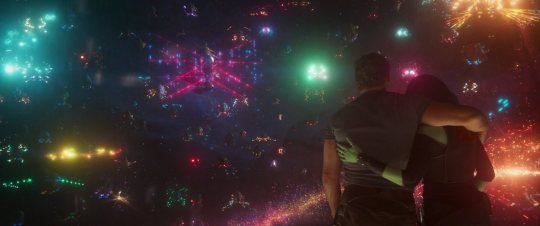
Does it pass the Bechdel Test?
Yes, six times.
How many female characters (with names and lines) are there?
Five (35.71% of cast).
How many male characters (with names and lines) are there?
Nine.
Positive Content Rating:
Three.
General Film Quality:
The pacing is a disaster, the story is weak, and if the style of comedy isn’t to your taste it can be very grating, but the central theme has at least some glimmers of genuine quality.
MORE INFO (and potential spoilers) UNDER THE CUT:
Passing the Bechdel:
Gamora passes with Ayesha. Nebula and Gamora conflict. Gamora asks Mantis about her empathic abilities. Gamora passes with Mantis. Gamora and Nebula fight. Gamora confronts Mantis.
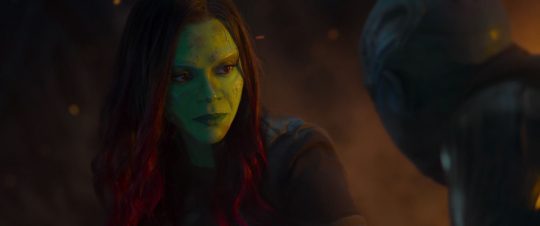
Female characters:
Meredith Quill.
Gamora.
Ayesha.
Nebula.
Mantis.
Male characters:
Ego.
Peter Quill.
Drax.
Rocket.
Groot.
Stakar Ogord.
Yondu Udonta.
Taserface.
Kraglin.
OTHER NOTES:
Nice of Ayesha to randomly exposition on the way her people are created, even though it is not relevant to the plot or anything else at all.
Gold Ben Browder is the highlight of this film. Because it’s Ben Browder. And he’s gold.
The immature escape-from-the-Sovereign-fleet bickering between Quill and Rocket (with chimes in from Drax) while Gamora is the Token Female and Wet Blanket is just...chafing a really tedious cliche.
Drax hanging out the back of the ship as they’re crashing is one of those things where the characters are so unrealistically indestructible it makes it hard to engage with the idea that they’re ever in real danger. That happens a lot in this movie.
Android prostitutes. Sigh.
Daddy issues. Never seen that done before. Thrilling.
First time I saw this movie I thought it was a weird choice to make the raccoon the main character of the B plot, but to be honest, Rocket is the best of the Guardian characters and front-lining him is one of the better choices of the film.

The whole idea that Quill was able to hold an Infinity Stone because he’s half god really fucks over the whole ‘the Guardians teamed up to withstand the power of the stone together’ thing. Like, nevermind, that whole climactic moment from the first film didn’t mean shit, Quill is a half-god.
Kraglin thinks that Nebula would be the type to buy a pretty necklace or a nice hat and this is just one of those weak, gender-stereotyped jokes that makes me annoyed at the lack of awareness in writing ALIEN CULTURES and also just, like, the basic ability to comprehend character personalities. I complained about this when I reviewed the first Guardians film, but honestly. Whether in throwaway lines or entire plot arcs, these movies are rife with gendered writing, more than any other films in the MCU so far, and that doesn’t make a lick of sense. ALIEN. CULTURES. GUYS.
He’s playing catch with his dad and MY GOD, glowy god power should not be this trite and boring.
This script has a bad habit of over-playing its jokes. You gotta know when to stop, y’all.
URRRGGH, the momentum of this movie straight-up dies every time the plot shifts back to Quill and his dull daddy issues. The imbalance between the A and B plots is staggering.
Gamora and Nebula’s conflict and eventual reconciliation is one of those few quality emotional beats in this movie; the recognition that the hate that has been engendered between them comes from the abuse they suffered at Thanos’ hands, and that they are both victims of him, not of one another. It’s a kind of insightfulness that is surprising, considering the cliches and under-developed arcs that populate the rest of the film.
Credit where it’s due for genuinely funny jokes that they don’t overplay: the Mary Poppins gag, Drax’s nipples, the giant Pac-Man.

Yondu deserved a better movie, man. I don’t know why the rest of this story is such a mess when the little slivers it gets right are so spot-on.
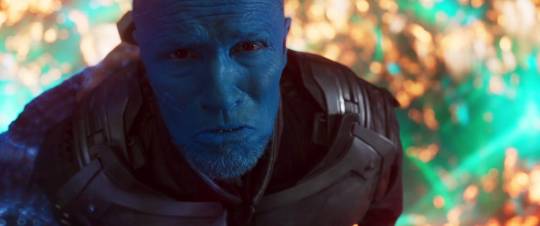
So, daddy issues. It’s one of the most overdone cliches in the history of storytelling, typically stemming from a very performative-masculine root (the father as the only/most important role model for his son, specifically in modelling manliness), and/or the old-fashioned patriarchal idea of the son as his father’s heir (and the idea that that makes the relationship between a father and son more profound than any other). Men love to write stories about their daddy issues, despite the fact that they’re rarely interesting or unusual or different to the billion other daddy issues stories that have already been told. As such, the fact that this movie is built around that same-old-same cliche is a fact distinctly to its detriment; that said, it’s also the one well from which it draws any spark of meaningful inspiration.
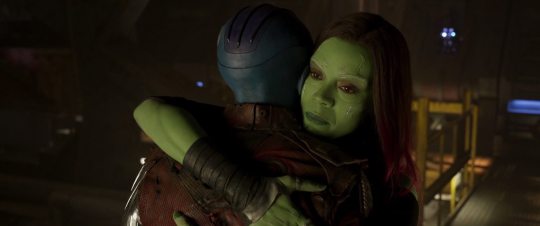
The dot points above have already made it clear to which sparks of inspiration I refer; the Daddy Issues threads with Gamora and Nebula and their abusive father Thanos, and Quill’s realisation of the way Yondu ended up filling the fatherhood role in his life. Gamora and Nebula’s Daddy Issues are automatically fresher than the average on account of them not being dudes (Ant-Man had the same thing going for it, though that movie made a much greater strength out of it); that said, the fact that Thanos’ terrible parenting forms the backbone of the two sisters’ conflict and eventual unification is not what makes that slice of the plot work: it’s the sibling bonding, not the Daddy Issues. The sibling bonding is where the fire’s really at (again, enriched by the fact that the characters are female; funny how the under-representation of women (or any group) in media can make even small amounts of representation seem impressive just for existing), but unfortunately, that bond is pared down to the absolute minimum number of scenes possible for functionality as a subplot, and therefore we never really get to enjoy what it offers so much as we kinda point and wave at it as it goes by. Yondu gets a bit more play, both through the character’s own ruminations on his life/personality/relationships while hanging in the B plot with Rocket, and through Quill’s Daddy Issues whining in the A plot to which Yondu’s relevance provides the only saving grace. Still, Yondu’s place in the plot and in Quill’s life only gains narrative weight in the final act, leading to a cathartic denouement for the character, but not for the film itself. The bloated emptiness of the A plot with Ego is something which Yondu’s meaningful sendoff cannot retroactively undo.
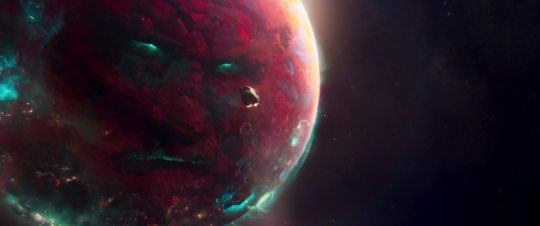
I’m...trying to figure out if I have anything nice to say at all regarding Ego and all that he entails, but I’m not coming up with anything. A godlike character who is also kinda-sorta a literal planet should not be so devoid of interesting factors, and yet, here we are. With every overdone boring Daddy Issues cliche in the book, played straight. We’ve got ‘I never knew my father!’ abandonment-resentment! We’ve got father-son bonding (heavy Americana edition)! We’ve got the heir-to-my-empire, follow-in-my-footsteps schtick! If it’s overdone and boring, we’ve got it! The fancy special effects visuals can’t make up for the total absence of compelling plot (the first movie in the franchise also made that mistake, though it at least faked it on the plot front a little better), and the shapelessness of the story on Ego prior to the reveal wreaks havoc on the pacing of the movie; where the B plot has trajectory from the jump, the A plot just kinda wanders around, having nothing new or interesting to do or say, nor even any thoughtful ways to bring itself around to that aforementioned reveal (as with the first film, things just kind of conveniently happen and characters go places and say things at the opportune times; nothing flows naturally from one event to the next, cause and effect style. I am baffled that people think James Gunn knows how to plot).
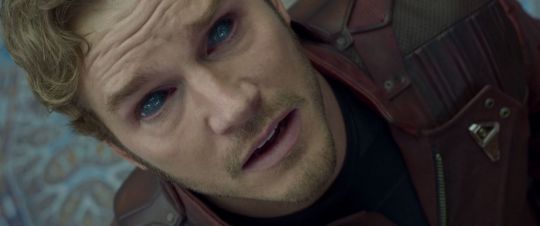
Speaking of characters going places and saying things, this film also does a very poor job of utilising its cast in a meaningful way, which makes it kinda embarrassing that it’s called Guardians of the Galaxy as if the whole team actually matters. Much like in the first film, Drax is just an extra without any real plot or purpose of his own, no narrative or character arc to speak of beyond being a total douche to the new female character on the block, Mantis (the fact that the movie uses Mantis as a punching bag and laughing stock for the so-called good guys is among its more tasteless sins). Groot, meanwhile, was already more of a gimmick than a character, but that’s up to eleven now, and like Drax he could pretty easily be excised from the story without lasting effect. Gamora’s interactions with Nebula are really her only good fodder; her tangential attachment to Quill is incidental and has no personal relevance for Gamora, she’s just providing someone for Quill to bounce his inane misogyny off, because how would we recognise him without it? Quill being the centre of this plot does at least make sense this time (sleeping pill that it is), unlike in the first film where he was frankly pointless to the story; nevertheless, the drudging Daddy Issues cliche of this movie fails to make anything insightful or impactful out of Quill’s experiences. As noted earlier, Rocket is, bizarrely, the only character who feels like his story matters, and it’s his and Yondu’s character exploration that wins the prize as the highlight of an overall weak, spectacle-laden film that thinks it’s much funnier than it really is.
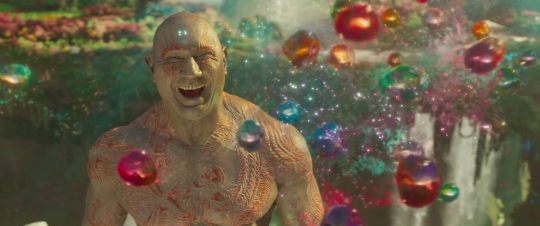
It’s no secret at this point that I don’t care for the Guardians franchise, but it isn’t complete absent glimmers of good promise and creative storytelling. Unfortunately, it’s also largely overrun with lazy plotting and vaguely-connected strings of shenanigans that prioritise rapidly-staling comedic beats over any semblance of narrative cohesion or character development. A rocking soundtrack and a smattering of toilet humour does not a worthy film make; it’s not like I’m going in looking for some high-brow drama, I just prefer my entertainment to hang together a little better than this does, and it surprises me a bit to hear people sing the praises of something so very, very messy. Whatever. It did its job for Marvel’s bottom line, so I don’t expect they’ll cook up any quality improvements for the third film of the franchise, when it comes. I sure would be glad to be wrong, though. There’s so much potential they’re wasting here.

#Guardians of the Galaxy Vol. 2#Marvel Cinematic Universe#MCU#Bechdel Test#female representation#Guardians of the Galaxy
3 notes
·
View notes
Text
The Summer of Adventure: Chrono Cross
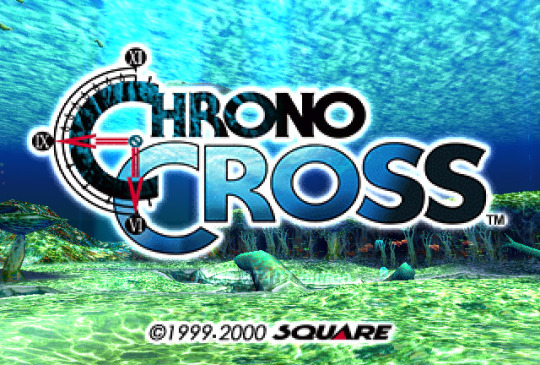
Original Release Date: November 18, 1999 (JPN)
Original Hardware: Sony PlayStation
Chrono Cross is a game that just about every fan of JRPGs has an opinion on. Put in the unenviable position of having to follow up on what many consider to be the best game of all-time in the genre, Chrono Cross chose to take one of the most difficult routes possible. It is undeniably a continuation of the events of the first game, with its main plot serving to tie up one of the loose ends from Chrono Trigger. At the same time, it doesn't seem to be bound by that game at all. At times, it even appears to treat it with contempt. I want to say that Chrono Cross would have been better off as a stand-alone game, but I'm not sure it could have drawn out the same level of emotion from players had it gone that way. Chrono Cross was praised to an almost ridiculous degree when it first launched, but the backlash on it in the years that followed was one of the biggest I've seen in my whole time in the hobby. What's the deal?
Chrono Trigger released with a bang in 1995, riding on the back of a dream team of talents including Final Fantasy creator Hironobu Sakaguchi, Dragon Quest creator Yuji Horii, and famed Dragon Ball artist Akira Toriyama. Its excellent graphics, progressive mechanics, and compelling time travel hook made it an instant winner. Even with more than 20 years down the road, the game is considered to be one of the finest JRPGs and Super NES games. Some would even put it on their short list of the best games of all time. I have friends who make a yearly playthrough of the game a priority, squeezing the game's finite contents for every last drop of enjoyment possible. It's been ported to multiple platforms including the Sony PlayStation, the Nintendo DS, and iOS.
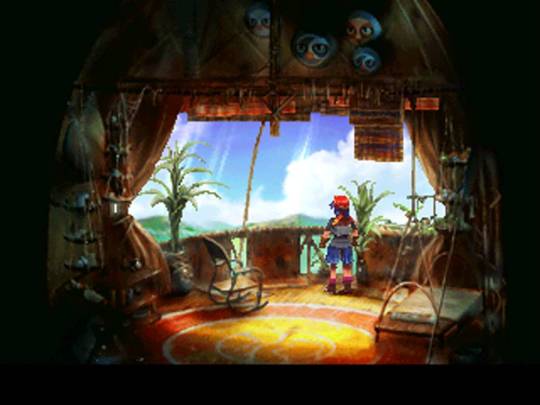
Its sequel would face different circumstances. That dream team had moved on to other things, leaving the less flashy staff members who had shouldered a fair portion of the load of the first game, albeit behind the scenes. The director's chair was occupied by Masato Kato, a well-known game writer who helped pen the stories for Chrono Trigger, Final Fantasy 7, and Xenogears. This was only his third turn as a director, with previous credits on Ninja Gaiden 3: The Ancient Ship of Doom and the Japan-only Satellaview visual novel Radical Dreamers. Perhaps notably, Chrono Cross is also the last game he directed. Naturally, he also provided the story for the game. The game was produced by Hiromichi Tanaka, who would soon take point on Final Fantasy 11. The character designs were provided by Nobuteru Yuki, best known for his work on the anime series Escaflowne.
Considerable talent, to be sure, but the change in directors, designers, artists, and producer made for a game that looked and played almost entirely differently from its predecessor. Besides Kato, the one big returning name was composer Yasunori Mitsuda, the man who had worked himself sick in his composing debut on the first game. Having put a few more games under his belt, Mitsuda was ready and able to deliver a stunning soundtrack that I still think is one of the greatest of all-time. While Chrono Cross had a whole new look and a more confident sound, it was still a great-looking game with some very progressive ideas of its own. One box that would remain unchecked, however, was the time travel motif. There is a little bit of time travel in the story, but you're not the one doing it. Instead, Chrono Cross focuses on crossing between parallel worlds. It's an interesting concept that plays well to Kato's strengths as a writer.
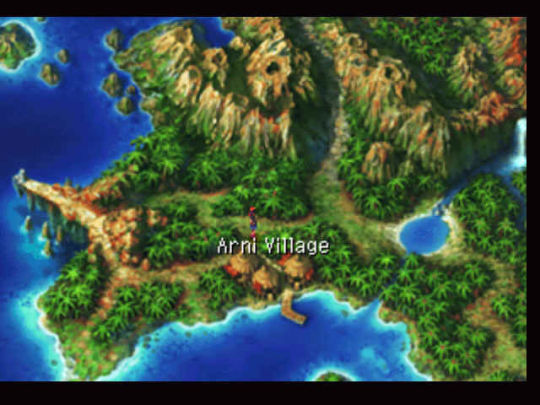
Interestingly, Chrono Cross was the third kick at the can for a sequel to Chrono Trigger. The first, Radical Dreamers, covers part of the same narrative ground. Released only in Japan and exclusively through the Satellaview download service for the Super Famicom, Radical Dreamers introduces some characters that would reappear in slightly altered forms in Chrono Cross, along with a short scenario that would also show up in the latter game. This was only ever meant as a side project, largely existing simply because Kato was annoyed by the loose ends the plot of Chrono Trigger had left. The next potential candidate was the game that would become Xenogears. Initially pitched as an idea for Final Fantasy 7 before another idea won out, it then was planned as a follow-up to Chrono Trigger. After a lot of disagreements, it ended up being its own thing, though it's not hard to spot the connections between it and Chrono Cross.
It was after Xenogears wrapped that Square officially put together a team to create a new Chrono game. The creative talents involved have given some conflicting reasons for the game's dramatic departure from the original game, but the gist seems to be that they didn't feel like rehashing things. They felt doing time travel again would be a cop-out, that a new cast would appeal to potential new players, and that it was important to take full advantage of the new hardware they were working with. As both Tanaka and Kato have strongly asserted, the game's title is not Chrono Trigger 2, so fans probably should not have expected a direct sequel. That kind of feels like a post-hoc excuse to me, but it is what it is.
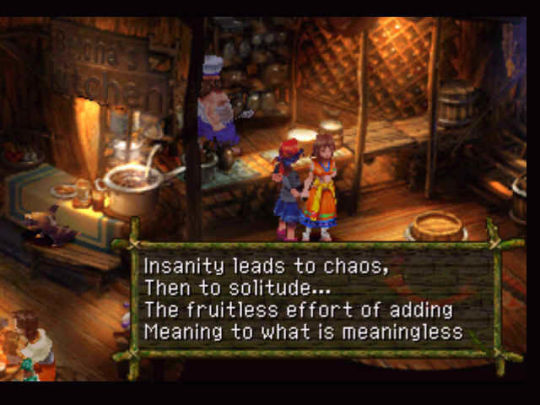
The game released in late 1999 in Japan, but its overseas release would end up coming in August of 2000, not too far ahead of the PlayStation 2 launch. As a highly-anticipated sequel and the culmination of the Summer of Adventure marketing campaign, Chrono Cross came out of the gates like a rocket. The reviews from critics were nearly unanimous in praising the game, with some publications breaking the safety glass on their rarely-used perfect scores to really underline the point. I distinctly recall a major backlash towards American magazine Electronic Gaming Monthly because one of their three reviewers dared to give the game a score of 9.5 out of 10 instead of a perfect score. Given the many shared circumstances between Chrono Cross and Legend of Mana, it's interesting how different the initial reception to each was. But for however much Chrono Cross diverged from Chrono Trigger, it was still quite recognizable in broad strokes. I think that's what saved it from the more immediate negative response its stablemate received.
That said, the negative response did eventually come. It felt like the bigger a fan a person was of Chrono Trigger, the worse they would eventually see Chrono Cross as. Cross had a different, less optimistic tone to it. Rather than focusing on a handful of characters, it chose to spread the love across a huge cast, hoping to fully sell both its world and its high concept. The story broke one of those unwritten rules of fiction. If you give the audience a "happily ever after" ending, revoke it at your own peril. That's just what Chrono Cross did, and it didn't even make a particularly big deal about it. Chrono and Marle died off-screen a long time ago in some random attack from the Porre Army. Lucca's death is an important plot point, but it also happens before the events of the game. Robo at least gets a significant end, but he too does not survive. Ayla, Frog, and Magus don't even appear in the game, with the latter's absence being particularly preposterous as this entire game orbits around his sister, Schala.
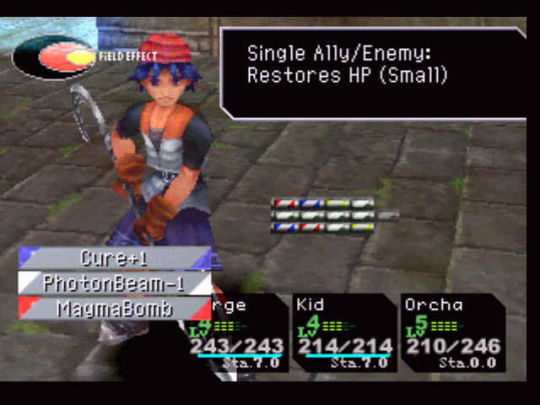
Just in case you think you can delude yourself into thinking the main three aren't really dead, their ghosts actually appear a few times during the course of the game. In short, it was all for naught. Nobody from the main cast of Chrono Trigger got a happy ending, as far as anyone can tell. Heck, you didn't even really save the world. This didn't sit well with many players. Others were put off by the lack of time travel, perhaps expecting there would be some instances later in the game. Even those who could get around these attachments to the plot and characters of the first game were faced with an experience that was almost antithetical to Chrono Trigger.
That game was a fairly light, fast-paced, moderately linear game that wore its messages on its sleeves. Chrono Cross, by comparison, is kind of depressed with existence. The pace is slower, the tone is darker, and the messages are muddier. Although the finished game was heavily pared down from the original plan, it probably could have done with a few more editing passes. For every really interesting, thought-provoking point in the game, there are at least two bits that don't seem to have much purpose at all. Maybe that's intended, though.
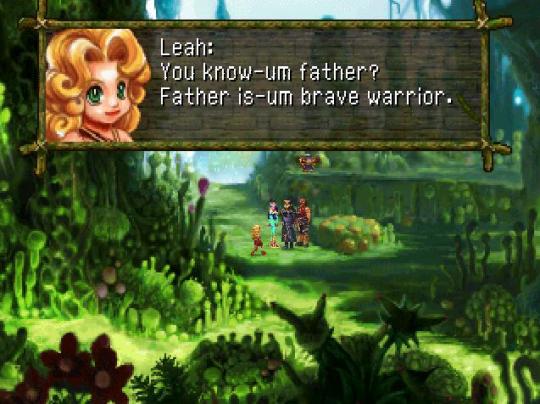
Cross serves as a fascinating counter-point to Trigger in some ways, however. In the latter, your intervention is, as usual for the genre, undoubtedly a good thing. Apart from the early set-up where Marle almost writes herself out of existence, your time-hopping shenanigans never have a negative effect on things, at least as far as you can see. Your presence makes the world a better place, even though you are breaking virtually every fundamental law of nature in doing so. The game ends without addressing this particular karmic debt, and that's fine. It doesn't have to. It's not that type of game.
Chrono Cross has something else to say, though. The premise sees your character Serge traveling to a parallel dimension where he was killed at a young age. After 10 years, this other dimension has a ton of differences compared to your home dimension. The kicker is that many of them make for a better world. Some people are worse off, mind you. But the key is that your existence doesn't make things better for everyone. Indeed, Serge not dying has downright ruined some people thanks to that trusty old Butterfly Effect. One of the more enjoyable aspects of the game is in seeing how people's lives are going in each dimension. At any rate, Serge's death is a good thing for some people. A fact that becomes all the more painful when you discover that Serge was really meant to die. His continued existence comes through unnatural means, and even poses something of a threat to the world order.
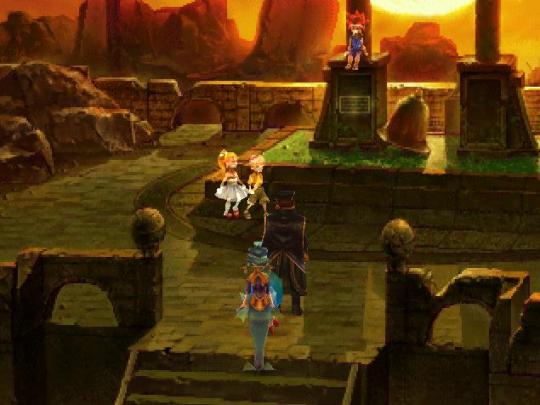
This isn't just told to the player, either. There are a number of situations in the game where you have the option to make an active choice versus just passively letting things play out. In some of those cases, your decision to act makes things much worse for everyone, while inaction ends up with the desired result. Like many of Kato's other stories, Chrono Cross eventually ends up being a little bit too on-the-nose with its theme, with a primary antagonist literally named FATE. From a personal point of view, fighting fate is a good thing for Serge. It keeps him alive. But in many ways, it's a purely selfish act of self-preservation. It only accidentally has a good result. Of course, this is all the work of a seriously convoluted plan on the part of Balthasar, the Guru of Time. It seems that pesky old Lavos is still alive and threatens to merge with the missing Schala. Balthasar set all of the events of the game in motion to bring Serge to the point that he could defeat Lavos, preventing it from becoming a Time Devourer and eating all of time and space.
Like the first game, Chrono Cross has multiple endings. The best one involves trying to squeeze out a puzzle-like sequence of special attacks on the final boss, a sequence that you may or may not pick up on from the clues. Should you manage to pull that off, you'll save Schala and be treated to a somewhat bizarre ending where she ponders the meaning of life in the face of evolution and survival of the fittest. It's pretty clearly Kato talking at this point, mind you. Schala concludes that although individual lives may seem to be meaningless if they aren't significant in the evolutionary sense, every being does its part to lead up to those significant examples. Thus, every life is an important part of the chain, so life isn't meaningless after all. Phew, thanks for sorting that one out.
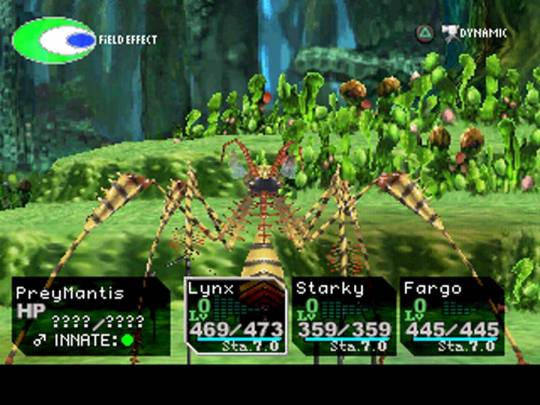
She then signs her letter off in Kid's distinct Australian accent, indicating that her memories have been combined with those of her clone. She promises to find you again someday, sometime. The credits then roll, as a woman who is supposed to be Schala can be seen wandering around various locations in modern-day Japan. It's apparently meant to signal to the player that their very own Kid might be out there somewhere, searching for them. It really only works if you live in Japan, though, since the locations they picked are probably not going to strike a chord with anyone else. To be honest, this is a game full of good ideas and compelling situations, but its main plot ends up collapsing on itself in a way that is highly characteristic of Square games from this era.
This was only my second time playing the game, if you can believe it. I really enjoyed it the first time, but I was definitely high on hype. I wasn't sure how I would end up feeling about it after so many years had passed. I've seen my opinions of Square games I once held sacred turn around in big ways before, and I worried that this might be one of them. At the beginning of the game, as I was enjoying the music, brightly-colored sights, and interesting set-up, I felt that I had perhaps underestimated Chrono Cross. The further in I played, however, the more it started coming back down to Earth. There are too many inconsequential characters, the storyline loses its coherence partway through, and the battle system takes a little too long to sort through in basic skirmishes. This is also a game that virtually demands a guide, and even with one, you're not able to see everything in one playthrough. That's fine, but I don't know that I really want to play this again for a long while. Even the first time, when I was absolutely in love with it, I moved on to other things after getting the best ending.
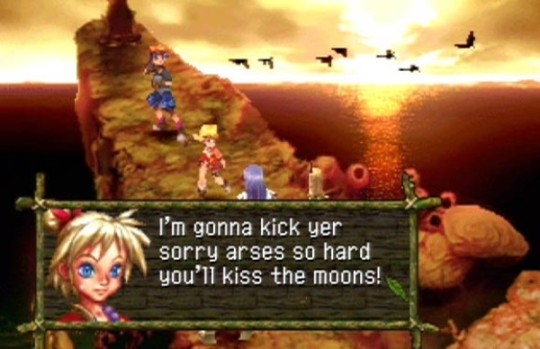
Being a little older and more experienced, I can certainly appreciate some of the ideas the development team tried to apply to the mechanics. That final boss "puzzle" is pretty bad, but in most other respects, I think the element system that governs skills and item use is quite clever. It's a little too restrictive early on, but I like the idea of forcing players to choose carefully what they want in their toolbox. It's a good idea to have a diverse set of skills ready, but if you want to take advantage of field effects, you have to stack certain elements. You might also want to set up a custom set of elements for individual bosses in order to exploit their weaknesses. The only real down point is that this involves a lot of micromanagement that quickly becomes tiresome and isn't totally necessary. I suspect most players will just roll with a general load-out of elements and only change out individual pieces now and then.
I'm always interested in how games try to circumvent grinding. It's been an issue virtually since the inception of the RPG genre, and it's honestly debatable as to whether it's something that needs to be addressed. If players like it, why not give them the option? I guess the problem is that while grinding is often the path of least resistance, it's not fun for everyone. Since it's the most mindless thing to do, people will opt to do it in lieu of trying to reconsider their strategies, even if they don't enjoy it. That leads to people coming away with a poor impression of a battle system that probably would have thrilled them if they had played it without grinding. I think the Japanese focus on intricate combat systems naturally results in designers trying to crack this particular nut.
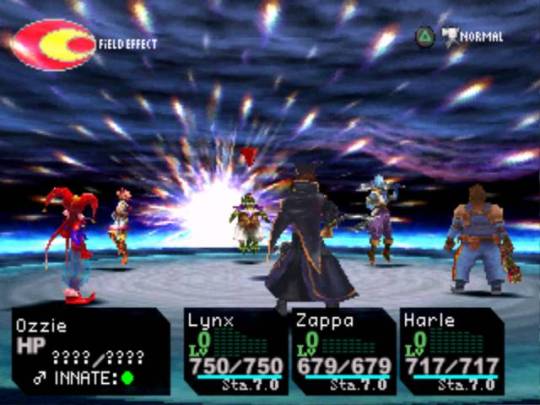
Chrono Cross's approach is to put in hard gates on growth that are connected to your progress in the story. You're given a star ranking that determines how far your party members can grow. Your stats will only see so many gains until you earn a new star by clearing a story boss of some sort. There are other incentives to battling enemies, such as giving you drops that you can use to create new equipment, but you can't simply grind your way past a tough boss. You have to plan your way through it. Luckily, one of the other unique quirks of Chrono Cross assists with that. You can run from any encounter, up to and including the final boss. No, it doesn't make sense from a narrative standpoint, but it makes this one of the fairer RPGs around. Go in, see what elements will serve you best, and if you don't have them, escape.
I think it's that desire to pick away at the accepted standards of the genre that ties the game to its predecessor more than anything. Unfortunately, that's the least likely thing to be appreciated by fans looking for more of the thing they liked before. On top of that, the desire to push the genre in new directions doesn't always work out the way a game's creators might hope for. I don't think anything in Chrono Cross went spectacularly badly, but not many of its innovations proved to be influential. That goes hand-in-hand with its weaker reputation compared to that of Chrono Trigger.
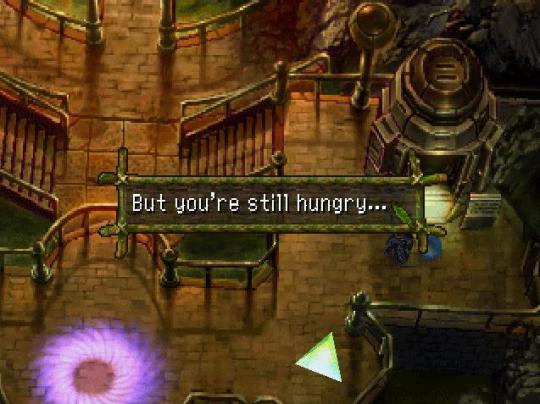
While Chrono Cross isn't entirely forgotten, it does seem like the series as a whole is finished. Chrono Trigger probably has a lot of re-releases in its future, but I'm less confident that Chrono Cross will show up again as anything other than a PSN download. Even Kato's attempt to tie the two games together more strongly in the Nintendo DS port of Chrono Trigger failed to re-ignite interest in Cross. I suppose that speaks to the difficult balancing act that sequels have to pull off. If a game rehashes too much, it will never escape the shadows of those that came before it. On the other hand, if the developer either fails to or chooses not to recognize the qualities that fans appreciated in the original game, history can be swift with the write-off there, too.
It's often the case that when I replay a game, I come away with greater clarity concerning my feelings about it. But even after making my way through Chrono Cross again, I find it hard to nail the game down. I kind of love it. I also kind of hate it. I wish they had cut the fat off it as much as they had with Chrono Trigger. Some of the themes it brings up are brilliant, but others seem like so much belly-button fluff. I think it's a more interesting, more challenging game than Chrono Trigger tried to be. That it failed in many of its ambitions doesn't affect the respect I have for that particular approach. Some small part of me, however, would have been far happier with a safe sequel in this case.
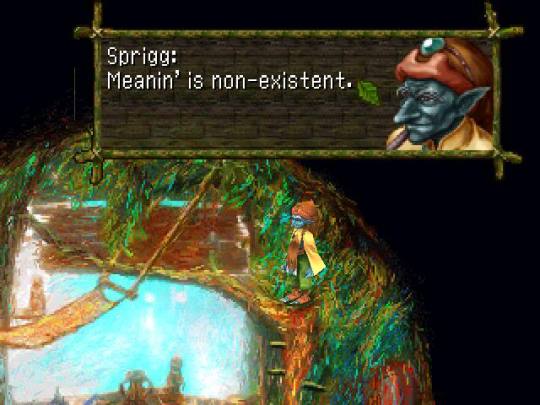
Previous: Threads of Fate
If you enjoyed reading this article and can’t wait to get more, consider subscribing to the Post Game Content Patreon. Just $1/month gets you early access to articles like this one, along with my undying thanks.
1 note
·
View note
Note
There are more jonerys shippers on freefolk nowadays but it's not a very popular ship. J*nsa's not that popular either but the j*nsa shippers are more well welcomed in the community because most of them glorify Jon. Most show fans hate Sansa. They don't really understand her character. They just want the old Prince Charming saves the damsel in distress trope. Sansa apologized to Jon. That's why the fanboys favor her over Dany. They're worried Jon will lose his manliness if he kneels for a woman
This is a very interesting perspective and I had not thought about it. That some fans would embrace or tolerate J*nsa more because with S*nsa Jon doesn’t loose his manliness. I don’t think that too far off actually.
Before I say anything else, I should say I like Sansa. Her book and show characters are not completely in line with each other, but that happens with most of the characters. I do think she catches a lot of flack because she opposed fan favorites like Ned and Arya. While her behavior in King’s Landing was irresponsible, she was child and could never foresee how things would turn out. She suffered a great deal and didn’t deserve what happened to her but neither did her siblings. However, GRRM wanted his Starks to suffer so they did.
Getting back to your ask, I have considered the dynamics of a relationship between Jon and Dany quite a lot. While some complain that it would be a cliche, I think most of them hate the fact that Dany is in such a position of power and that in having that power she could have power over Jon. You see that a lot with those people who want Jon to claim Drogon or have Dany bend the knee to Jon because he has the superior claim. I don’t think that ASOIAF is about the One True Hero, Hidden Prince claiming his birthright because Jon Snow is not about that, Jon Snow want to save the world and so does Daenerys Targaryen. And this is why they make such a good paring.
For all her wealth and power, I can’t think of a time when Dany ever thought about money and getting more. She wants a large army but that’s about taking back the throne, her birthright as she sees it. The last thing that is left of her family and what Dany wants most in the world is family and to come home.
So, while yes Dany has more resources than Jon, as people, I’ve always seen them as equals, having experienced so many of the same things, and I think that’s how they will see each other and bond with one another because of that. And that’s rare in fantasy, there is usually The One who is the be all and end all, and that’s not what ASOIAF is about, the multi POV structure should tell us that. And while all these fans claim that they love ASOIAF because it’s so different, they are still holding on to the traditional structure of a hero’s journey. That’s not to say GRRM doesn’t followed traditional story telling, of course he does, it’s there for a reason, and he also uses plenty of tropes while I’m at it. But he’s looking at the hero’s journey from multiple POV, he’s exploring many heroes and how each of their journeys unfold.
In the end I think all our heroes will win some and loose some.
19 notes
·
View notes
Text
Sneaker Head vs. Sneaker Lover
By: Illest Mozart
Interviewee Aaron C.
1. Do you collect sneakers? Or do you buy and wear them?
A: It's a mixture of both because I'll buy sneakers and not wear them for like a year because I don't like wearing what everybody else is wearing so they'll be in my collection but eventually I'll wear them
2. How many shoes do you have in total?
A: Good Question Off the Top Of my head I Think a Good 30-35 I've giving sneakers away so that's why the numbers so low
3. What do you think of the increase in the sneaker hype?
A:If you Ask me personally I think its influence, I think anything Kanye puts on his feet everybody is going to flock to because everyone follows his trends, I also think different color ways and designs play a big part also collaboration with brands and designer help
4. What’s your definition of “Sneaker head” do you like that term?
A: A sneakers to my is someone who isn't basis or just rocks certain/one Brand Or rocks something because this person says it's cool, I look at Guys like The Mayor, Joe La Puma, Ronnie Fieg, Clark Kent, Wale Etc Those Guys Have been collecting sneakers for years and have a wide variety of brands and sneakers those are the true sneakers heads and that term has always be cool with me
5. What is the craziest thing you’ve done to get a pair of sneakers?
A:Two things that's not really that crazy I spent like 300 dollars on a pair of Jordan 6 DMP in high school and I Camped Out from like 5 in the Morning
6. What would you consider a classic Sneaker
A: Something That No Matter How Many Times Its Released Or put Back On the market its will sale like the Banned 1's Or the Cement 3's Or Air Max 95 the List goes on
7. What is your favorite Sneaker brand currently?
A: I'm Nike Threw and Threw, Don't get me wrong adidas has been killing it but that would be me feeding into the hype/Kanye Thing and I just can't jump ship on Nike, but I also love new balance
8. What is your favorite # Jordan of all time
A: Infer Red Jordan 6's the best and I think most underrated Jordan to me that's one dope ass Sneaker
9. What’s set you apart from all the other “Sneaker Heads”?
A: I'm not a sneaker head I just loved sneakers but what sets me apart is I don't base what I wear off what someone else thinks is cool the sneaker world is just one big copy cat game
10. Do you think your collection is worth it?
A: Of course I have some rare sneakers that people stop me and ask when or where I got them from not to mention I've sold so many pair so I would say my collection is definitely worth it
11. Do you trade sneakers?
A: I have before I've sold true blues for hundreds of dollars, the 2011 bordeaux, I traders my raptors for like 3 pairs of sneakers and cash I made a come up off sneakers like crazy
12. What do you think about women being “Sneaker heads”?
A: I think thats Dope, I think some of the best sneakers that have recently dropped have been for women, Just Make sure you got the same amount of heels that you have sneakers
13. What would you say to someone that says collecting sneakers is a waste of time?
A: Shut The Hell Up I've had people tell me that but I'll show them what a sneaker I have is selling for and what I paid for it and they'll ask me can I get them a pair to resell
14. How much do you think your collection is worth?
A: Couple Thousand give or take nothing to serious I regret selling some of the ones I've sold for the prices I could have made way more
15. What Makes a Sneaker Exclusive?
A: Everything From Colorway, The Sneakers its self, Brands, Collaborations ETC, for instance it's rare you'll see everyone wearing a pare of Jordan 7's DMP Or Royal 1's Or Black Cements Or Even Yeezy’s or a supreme sneaker Collaboration those are rare because they're so hard to get your hands on and so limited it's like the holy grail
0 notes